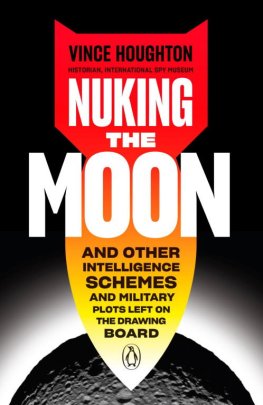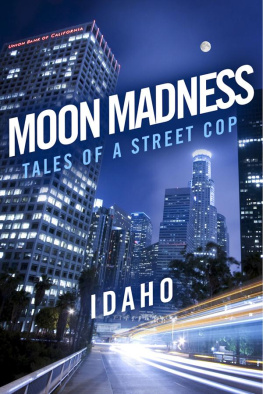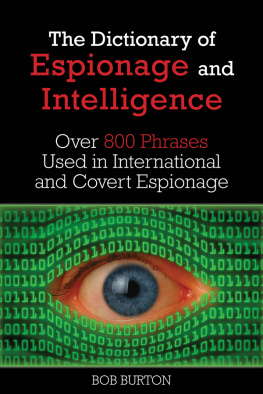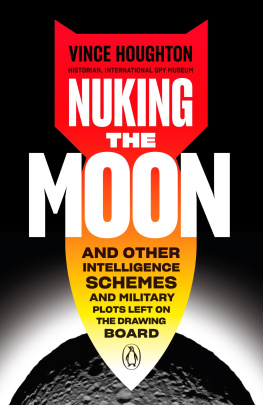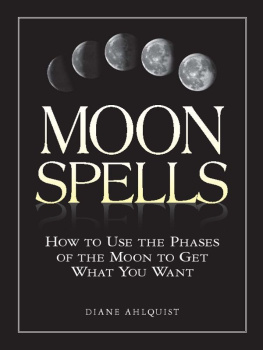Vince Houghton
NUKING THE MOON
AND OTHER INTELLIGENCE SCHEMES AND MILITARY PLOTS LEFT ON THE DRAWING BOARD

INTRODUCTION: LEFT ON THE DRAWING BOARD
This is a book about desperation.
That word has been so overused and misused that it has lost much of its impact. Too many stories about some local sports team desperate for a win, or some housewives desperate for whatever that show was about. These pretenders have trivialized a word designed to be used only in the most extraordinary of circumstances. It should be a powerful word, reserved for the urgent and overwhelming feeling that ones life is at risk. Its for the truly existential threats (another misused word), to ones country, ones family, ones friends, or ones livelihood. When the stakes couldnt be higher and the options slimmer. To feel desperate is to believe there are no good options, that everything that has been tried, or could be tried, is destined for failure. Desperation leads us to consider ideas that would have been unfathomable under normal circumstancesbecause desperate people make desperate decisions.
This is also a book about innovation.
Creative thinking about how things workand the possibilities of how things could workhas been the catalyst for the astonishingly dynamic technological transformation of the past hundred years. From the advent of lighter-than-air flight to hypersonic aircraft, from bolt-action rifles to electromagnetic railguns, from ENIAC to quantum computing, from one poor freezing soldier in a trench listening to intercepted wireless messages to the NSAs supercomputers collecting the metadata of billionsbrilliant people with innovative ideas continue to shape our world, and do it exponentially faster than the generations that came before.
But when innovation and desperation meet, trouble will usually follow. If necessity is the mother of invention, desperation is the drunk uncle. The guy who calls only once a year, at 3 a.m. on your birthday, with the greatest idea anyone has ever had. No matter how hard you argue against the logic of his narrative, no matter how many flaws you find in his reasoning, hes resolute.
This will work. It has tohes a desperate man.
Every so often, we are surprised when one of these ideas actually pans out. The U-2 and SR-71 spy planessome of the most innovative aircraft ever designedwere a result of American desperation to see inside the Soviet Union. Nuclear power, computers, the internet, modern textiles, personal encryption, even the process of how some of our food is grown were born out of a nations desperate fear to keep pace with an imposing rival. Much of that history has been written before. Countless books have been published about the remarkable and successful technology developed over the last century by governments for national security needs.
This is not one of them.
Most history books are full of stories of things that happened; this is a history book full of stories behind things that didnt happen.
Here we will take an expansive look at projects, missions, operations, and technology that were seriously considered, but didnt make the grade. Some were ultimately deemed too risky, expensive, dangerous, ahead of their timeor even certifiably insane. Others were canceled merely because they were overtaken by events: The atomic bomb worked, the war ended, the plans were captured, other technology superseded.
Generally, history books use events of the past to make powerful arguments about historical actors motivations, personalities, and states of mind. And rightfully sothis is part of what history books are supposed to do. But I contend that the evaluation of historical events is not enough. It can be just as important to investigate policies, decisions, and technologies that were considered at the highest levels, but then nixed for a variety of reasons. The intent of historical actors can be (and I argue is) far more instructive and illuminating than focusing entirely on the outcome of their policies.
Outcome history is the traditional way of viewing historical events, but it leaves much to be desired. It has severe limitations, primarily because its lessons are predicated on things that cannot be accurately quantified: fate, luck, misfortune, whatever you want to call it. If the D-Day invasion of Normandy had failed because of a freak weather system, or a lucky shot from a German soldier that took out a key American leader on the beach (or any number of other misfortunate scenarios), would we think any less of Eisenhowers plan? Using outcome-based history: yes. And therein lies the problem. Intent can be a very powerful tool for historians.
So leave your historical hindsight at the door. Ignore the fact that these policies, technologies, programs, and missions were scrapped before they became real. To get the most out of this book, you should heed the advice of Master Yoda: You must unlearn what you have learned. The outcomes of the programs are inconsequential to the overall message of the narrative. Outcome really doesnt matter here at all. Thats why this book scorns the counterfactualthe game of what ifvilifies it, mocks it mercilessly. The counterfactual is our enemy. We will not what if ourselves until we are blue in our faces, trying to rewrite history into a hodgepodge of ahistorical nonsense.
Deep breath. I might have taken that a little too far. Counterfactuals can be a lot of funwhen you are hanging out with your friends and family, debating the what ifs of the Kennedy assassination, or the Civil War, or the Protestant Reformation, or the Star Wars prequels, or the 1986 World Series. (I forgive you, Bill Buckner. Mostly.) Id be happy to join you all one day for a vigorous debate on historical counterfactuals, perhaps over your favorite adult beverage or a bottle of Yoo-hoo. But they have no place here.
Instead, all of these stories should have you saying, What were they thinking? The best way to approach this book is with an open mind toward how the decision makers were approaching the problems facing them. In almost every case, those in power were desperate to do something (anything) to combat their adversaries. Thus, What were they thinking? is exactly correctexcept I hope that you will be willing to truly embrace the question, and not see it as just a dismissive aside or a hasty pejorative. In all of these stories, very intelligent people were willing to do anything (or just about anything) to achieve or maintain national power. This resulted in extreme outside the box thinkingbut not so extreme that it changes the fact that these were serious people making life-and-death decisions. Their intent is just as important as their actions, and thats why this task at hand matters: It offers a unique, unusual opportunity to put us (the reader, the historian) in the mindset of the historical figures, and to understand the unique and daunting challenges they faced.
In some cases, this gives us an unconventional perspective on familiar figures. You might never see historic figures such as John F. Kennedy, Dwight Eisenhower, Winston Churchill, Franklin Roosevelt, or even Carl Sagan the same way again. In other cases, these stories resurface fascinating figures left in the dustbin of history, who might be household names had their ideas panned out.
The book is organized into four parts, each with its own theme, but all full of stories centered on the desperation that was the product of the sheer terror of World War II, or the ideological fervor and suspicion of the Cold War. In each case, the originators of these ideas truly believed their very existence was at stake. And their desperation led to some interesting choices.

